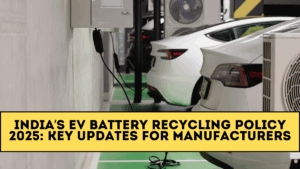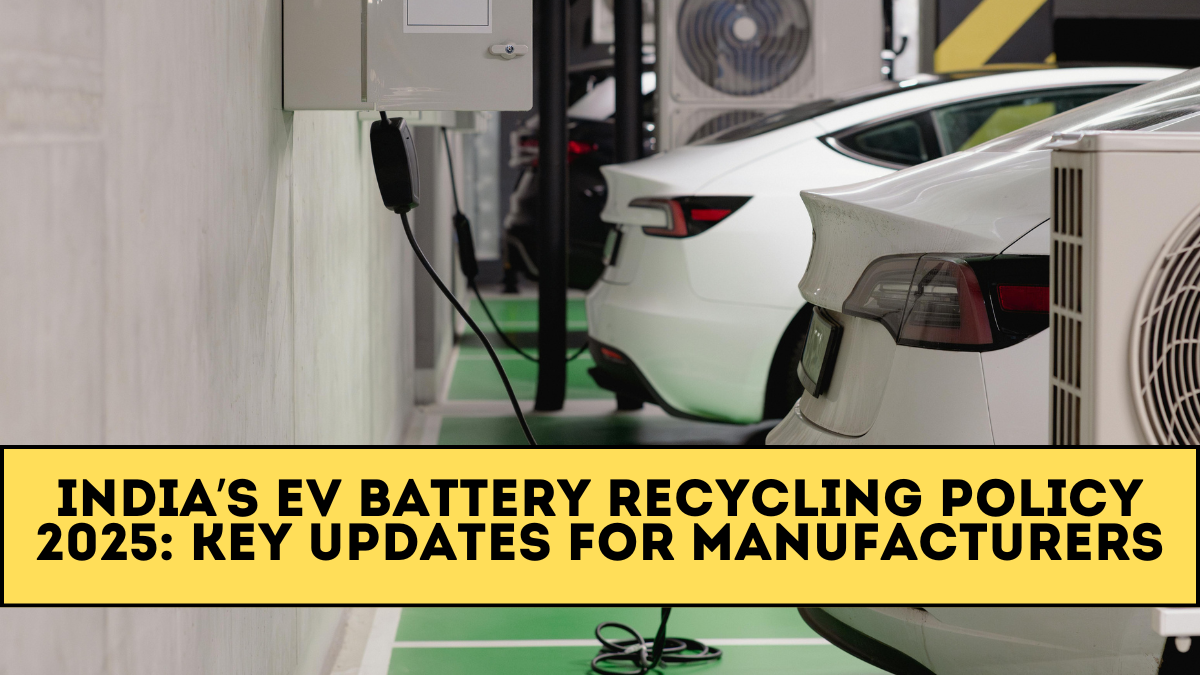India’s electric vehicle sector is expanding rapidly, creating a growing need for responsible battery waste management. To strengthen sustainability and reduce environmental harm, the government has revamped the EV Recycling Policy 2025. These changes aim to improve battery reuse, promote safer disposal, and support long-term sustainability across the EV ecosystem.
The updated framework places stronger responsibility on manufacturers and recycling companies to ensure that battery materials are recovered, reused, and safely treated.

Why India Updated Its EV Recycling Policy
The rise in EV adoption has led to a sharp increase in used lithium-ion batteries. Improper handling can cause pollution, health hazards, and fire risks. The EV Recycling Policy 2025 was introduced to address these concerns and create a more structured recycling pipeline.
Authorities now focus heavily on battery reuse and circular economy models, ensuring valuable materials like lithium, nickel, and cobalt are not wasted.
Emphasis on Battery Reuse and Material Recovery
One of the biggest shifts in the EV Recycling Policy 2025 is the push for extending battery life. Manufacturers are encouraged to assess old batteries for second-life uses such as solar storage or backup power.
This supports greater sustainability, reduces manufacturing load, and lowers the demand for mining raw minerals. The goal is to keep batteries in circulation longer and minimize environmental impact.
New Responsibilities for EV Manufacturers
Under the revised rules, manufacturers must track batteries from production to disposal. They are required to set up collection centers and collaborate with certified recyclers.
Producers also face stricter documentation and reporting standards. These steps ensure every battery is responsibly processed under the EV Recycling Policy 2025, reinforcing trust and accountability.
Certification and Safety Standards for Recyclers
Recycling companies now operate under a mandatory certification system. Only authorized facilities can process end-of-life EV batteries.
The policy highlights safe dismantling, storage, and transport procedures. This helps prevent accidents and ensures that hazardous materials are handled properly to support national sustainability goals.
Incentives to Promote Green Manufacturing
To encourage compliance, the government plans financial incentives, including subsidies and tax benefits for recycling-focused firms. Manufacturers adopting battery reuse solutions or cleaner recycling processes may receive additional support.
These incentives aim to build a robust recycling infrastructure that aligns with the long-term vision of the EV Recycling Policy 2025.
Strengthening India’s Circular Economy Vision
The revised policy reflects India’s commitment to reducing waste and improving resource efficiency. By prioritizing reuse and recovery, the government hopes to create a self-sustaining system for EV battery management.
This move helps reduce dependence on imported minerals and supports a greener manufacturing ecosystem built around sustainability.
Conclusion
The EV Recycling Policy 2025 marks a significant step toward responsible EV growth in India. With stronger rules for battery reuse, cleaner recycling methods, and better accountability from manufacturers, the policy supports a future built on efficiency and sustainability. As EV adoption continues to rise, these updates ensure that India’s green transition remains safe, efficient, and environmentally conscious.
FAQs
What is the purpose of India’s EV Recycling Policy 2025?
The policy aims to improve battery collection, recycling, and reuse to reduce environmental impact and promote sustainability.
How does the policy encourage battery reuse?
It pushes manufacturers to repurpose old EV batteries for secondary applications like energy storage.
Are manufacturers required to follow new guidelines?
Yes, they must track batteries, set up collection systems, and collaborate with certified recyclers.
What changes apply to recycling companies?
Recyclers must be certified and follow stricter safety and environmental standards.
How does the policy support sustainability?
By focusing on material recovery, reduced waste, and circular economy practices, the policy strengthens long-term sustainability.
